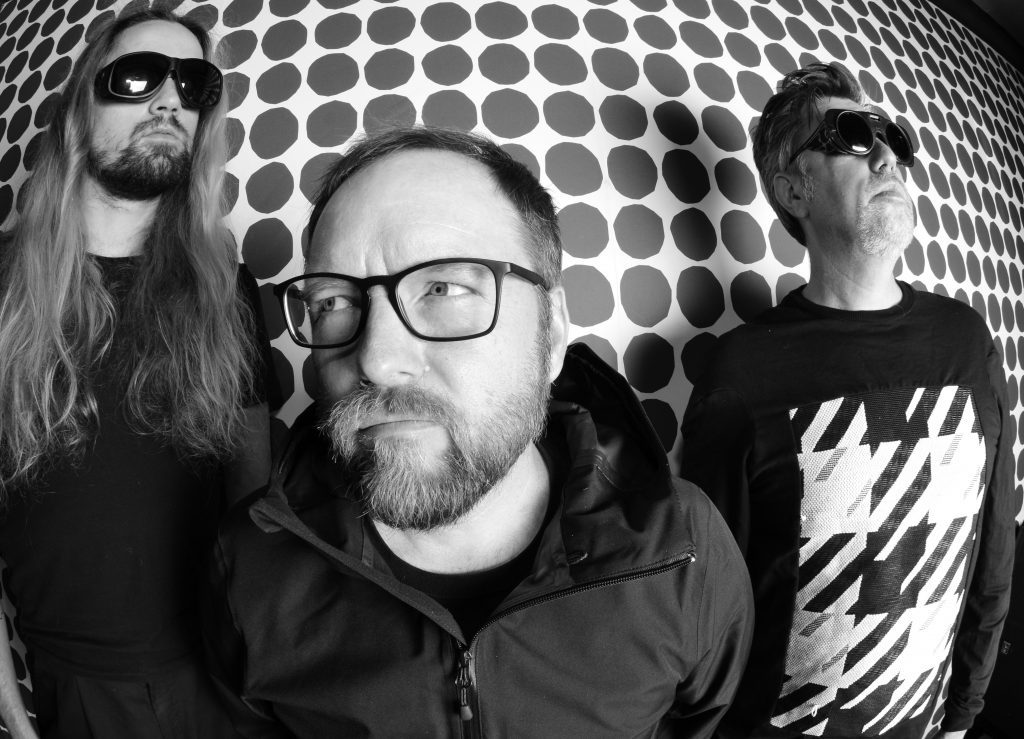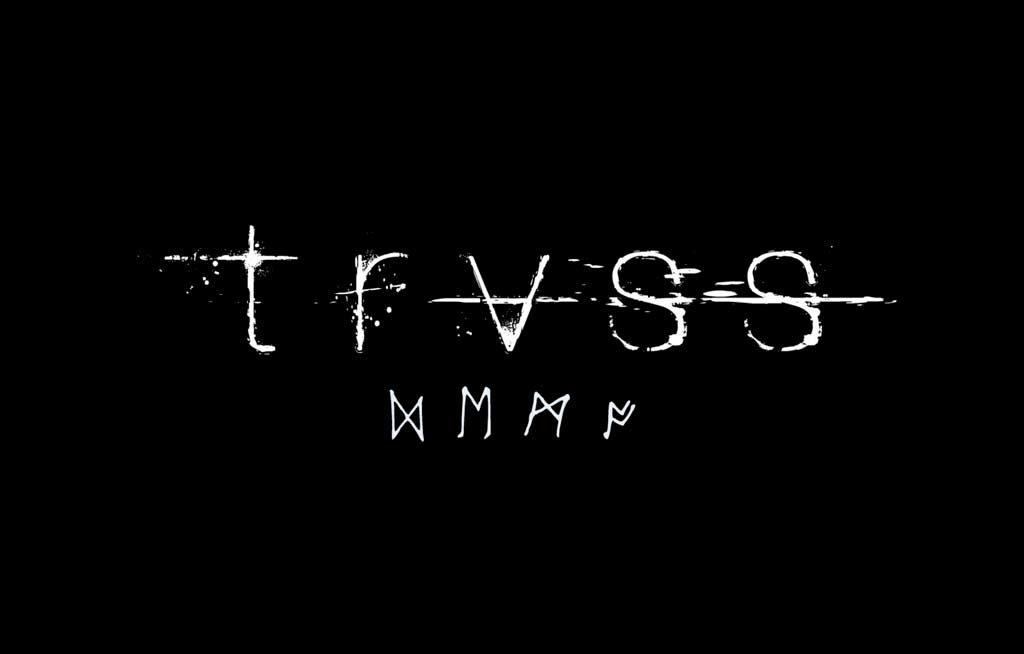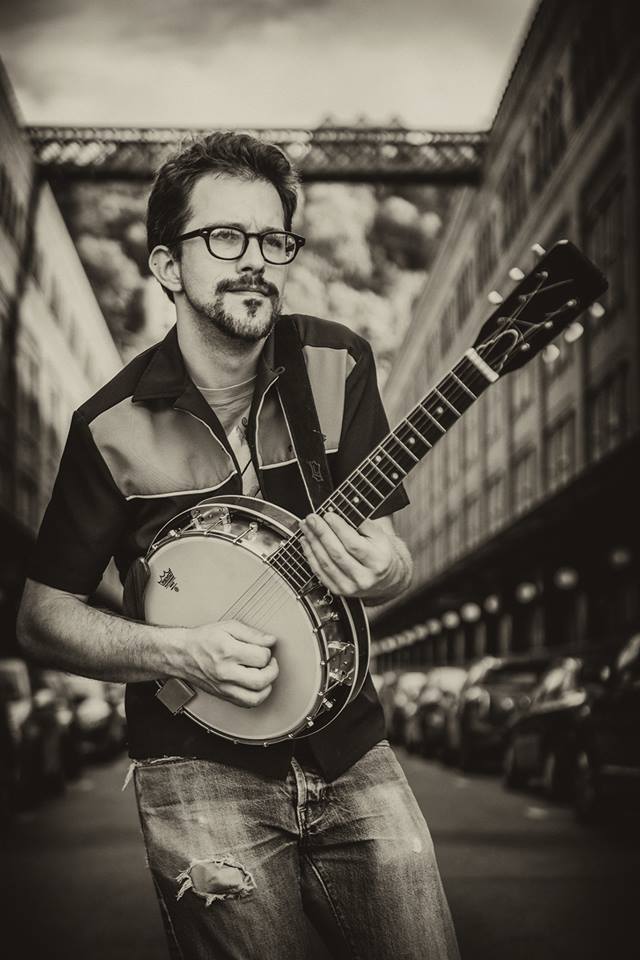For those looking for the surface of life to imitate art, I’m sorry to report that Bonni Evensen, the singer-songwriter behind the atmospheric pop ensemble Snowy, is anything but cold or wintry. Anyone who has a copy of Snowy’s debut CD, Lilywhite, knows that Evensen has that rare voice that, even when hanging in isolation, could melt your heart. But she also has a sense of humor and a quirky, quick wit that will catch you off-guard if you’re expecting another teary-eyed, half-reluctant indie crooner.
As proof, consider this little snippet, taken from a conversation on the cover art to Lilywhite, a collage of a headless ice skater standing on a rough, emerald green sea while a lighthouse is burning on the nearby shore:
“I love surrealism – like Magritte and Dali – [and] putting strange things together that don’t make sense. It [the cover] is a collage done in Photoshop. I found the skater girl in a 60’s painting I bought on eBay. She was one of those doe-eyed sad sacks and she was so funny and corny that I had to chop her head off. If you believe it, you can skate on very thin ice, or no ice at all. The sea image is also from an old painting and it looks very much like the rough Northern California coastline, which I love, comfortingly cold and lonely. The burning lighthouse? Who knows. I didn’t really think about all of it, I just kluged it together.”
Evensen’s music, though little of it has been released to the public, is anything but kluged together. Working with San Francisco-area musicians, she crafts densely textured, cinematic pop songs that resonate on deep emotional levels. Sure, sure, there are the ruminations on heartbreak and longing, but Evensen seems to inject an eerie snese of introspection to the proceedings. The listener, if they’re willing to come along for the ride, is seemingly rewarded for joining her in the carefully laid shadows and musical crevices.
Delusions of Adequacy recently got the chance to sit with Evensen in some of those shadows, talking via e-mail about the release of her band’s first CD, her obsession with all things musical, and her response when people ask how such a welcoming and warm person can make such sad and elegiac music.
<<<<<<<<<<
Delusions of Adequacy: I’m sure the Snowy record has drawn more than a few comparisons to Portishead. But while the majority of atmospheric pop floating about these days might draw comparisons to Portishead, you can actually hear a range of different musical influences on Lilywhite. This could be called a pop record, I suppose, but a good number of the songs also have a cinematic scope to them and your voice is far more emotive than what you’d hear fronting your usual pop-rock band. What sort of music were you listening to while writing the songs on the record? Do you feel this had an impact on the overall sound of the release? What, traditionally, would you say are your biggest musical influences?
Bonni Evensen: I love all sorts of music, really all sorts. I know, everyone says that, but it’s true. I’ll hear a snippet of music while watching an Alfred Hitchcock film and have it in my head for days and then a song comes out of it. I remember dancing around in circles with my little sister listening to the
Mancini soundtrack to The Pink Panther maybe 4,000 times when we were kids. I’ll go to a party and not remember a single conversation I had but will remember a song playing in the background, like Simon and Garfunkel’s “America,” and obsess on it for days until it works its way into a song. It could just be one note that I keep, or the mood or the feeling, wondering what on Earth the secret is to that song that grabs me in its paws and won’t let go. Sadly, nothing I write ever sounds anything like those gorgeous songs, but it is a reason to keep trying. A friend of mine plays me these odd Eastern European polkas on her accordion and they just amaze me. Really almost anything musical fascinates me. When I was a kid everyone in my family played music except for my dad. Trumpet, tuba, accordion, clarinet, piano, oboe, saxophone and flute. A complete oompa band! I played in jazz band through high school and I’m sure playing big band songs has influenced me in some ways that I’m embarrassed to admit. I love the great jazz vocalists like Billie Holiday and Nina Simone, and I love Chet Baker. Oh, and I secretly wish I was Colin Blunstone, the singer from The Zombies. I’d get a sex change operation if it would enable me to sound like him. In general I’d say, of course, I love 60’s pop music the most (Beatles, Brian Wilson, V.U., Love, The Byrds, Mamas and Papas, Burt Bacharach, Astrud Gilberto …) But then there’s soul, oh my. What about Al Green and Marvin
Gay and Smokey Robinson? Then, there’s a bit of country and blues: Hank
Williams, Lonnie Johnson and Lucinda Williams. Current artists, I’d have to say I really love Radiohead and Elliot Smith and, please stop me now, I could go on here forever. Because I have a hard time picking out one CD to play at a time. I mostly play a college radio station, probably 12 hours a day. I love it, KALX in Berkeley. The DJs constantly surprise me and I could hug every one of them. But let’s see, I’d say that collectively we were all listening to Radiohead and that could have had some impact on the sound of the production of the record. But there were so many influences flying in from everyone it’s hard to tell.
DOA: Aside from pointing to your own musical interests, how do you describe the record to those who haven’t heard it? Or to those who know you but don’t know about your music?
BE: I’m terrible at describing it. People ask and I’ll just say Moody Chick Music. Goth Housewife? Um, mostly I just say moody, emotional and slow. That sure weeds people out. People I know are always surprised when they hear it. They say things like “Oh honey, you’re such a happy girl. I had no idea you were so depressed!”
DOA: Tell me more about the process you go through – or have gone through in the past – as a songwriter. Lilywhite is an emotional record, but also one that feels very composed, very put together, very produced. Were the songs kind of birthed more or less as we hear them on the record, or were they smaller or more vague ideas that were expanded as the writing and recording took place?
BE: Oh no, they were very stripped-down. I have a four-track recorder and I’d just play around and put down very bad guitar tracks, and whatever else I had around. I play a keyboard or whatever until I hear something and put that down, add accordion, bongos and voila … a bizarre little recording is birthed. The songs then came into the studio and were transformed into pretty big productions, layer after layer.
DOA: While many of the songs on the record sound as if they are being performed by a full band, the title track stands in stark contrast, a ballad with an almost glacial pace that supplements a single guitar line and your voice with spare bits of strings and keyboard. On top of all of this, the song’s lyrics are more literal and straight-forward than what surrounds it: we’re bedside with you as you watch a friend undergoing treatment that is clearly tearing both of you apart. Can you tell me the story behind the song? Did the story dictate the feeling of the song? Was the decision to record the song as we hear it a conscious one?
BE: That one really stood apart. I wrote it after visiting my best friend in the hospital after having cancer surgery. She was young and lovely and it was such a strange and shocking environment to see her in. I went home that night and the song just fell out. I was so upset that I didn’t know what else to do. There was something so honest about it that it couldn’t really be covered up, so there it is. It wasn’t really a conscious decision to record it that way. The most wonderful thing about music is that I don’t have to think it all out first like I do in my work world. It’s so freeing to do things for the sake of doing them versus trying to make them marketable.
DOA: In addition to talking about your friend on “Lilywhite,” you seem to reference a lot of incidents from your personal life – either real or fictional or in between – throughout the record. How much do you find your own life working its way into your music? Do you see the songwriting process as a kind of catharsis, a way of addressing things from your personal life? Or is it more just that you tend to write what you know and your own life is fertile ground content-wise?
BE: My life always works its way into my music. I think anyone who says their music is anything but that is lying. Writing is one of the few things I can think of that truly makes me feel better. I take all of the darkness and try to make something beautiful-the old sand in the oyster story, it rips at your insides until you coat it with mother of pearl. The darkness is still there, but it’s wrapped in something beautiful and lovely to touch. I take such comfort in the sad songs of others when I’m feeling down, so I’m trying to give back. I can only hope to write songs that even slightly touch others emotionally.
DOA: While Lilywhite features strong performances from Steven Roback, Tim Mooney and others, you really do seem to steal the show. Is this the debut of Snowy proper or is it more a solo work with contributions from others? As the individual credited with the vast majority of the songwriting on the record, how do your initial ideas about the songs compare to the final product?
BE: Steven was very involved in the conception of most of the songs. He helped me flesh them out, and, thank God, he also helped me to stay honest. He would call me on my bullshit. He inspired me to write in the first place. Originally, I was just singing in a little side project with him and soon after we were recording demos at his home studio. Recording the final album was a group effort. If it was just me you’d be stuck with bongo and ukelele four-track demos. I feel very lucky. It was truly inspiring to work with such talented friends. Of course, it wasn’t always easy as it can be intimidating working with experienced people. Like one day, I brought in a song in that was in 3/4 time and Tim wanted to change it to 4/4 and at first I thought, NO WAY! But it actually worked out really well. I had to let go of control. And I hate that! Ha. This is my first record so I was more than a little shy and insecure. I was a nervous wreck. The next one has to be easier, right? I’m hoping to be more courageous next time and play more of the parts and have more input on the production, even if I’m terrible. I’m going to do a lot of experimenting with ProTools in the meantime. Uh-oh.
DOA: The big question for those who own the record: What’s on the horizon for you? Are there plans to tour or perform, or will you be focusing on another record sooner than later?
BE: I wish we could perform more but the logistics have been tough. Almost everyone has big priorities: families, jobs and other musical projects. I’m planning on recording again in the fall, and I can’t wait. I want to start performing more after that, and possibly prior to that. In the meantime I’m busy throwing my nets out for horrible and depressing experiences to write about. Ah, just kidding. I’m actually trying to learn to write about the happy aspects of life as well. Why is that so hard? I’ll have to think about that and get back to you. – Delusions of Adequacy, Sept. 22, 2003
-30-



